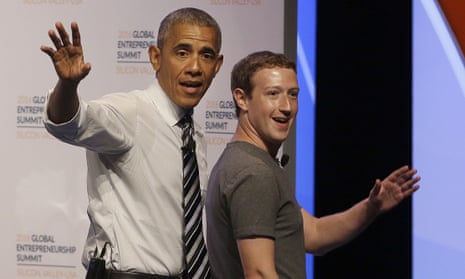Once upon a time, a long, long, long time ago, small children might get told off for being loud or unruly or, as we called it then, “disruptive”. Now? Not so much. In 2016, it’s cool to be disruptive. It’s what every startup in Silicon Valley is straining to do.
It’s what Airbnb has done – disrupting the hotel industry as Uber has disrupted taxis and Amazon has disrupted bookshops and almost everything else. Two years ago I went to a conference in San Francisco, TechCrunch Disrupt, and met many people claiming to disrupt many things, including, in one case, socks.
But what no one anticipated was that, though it may be convenient to summon a motor vehicle to one’s home with a tap of a button or to buy things online while wearing pyjamas and possibly drunk, it might also lead to where we are now: 6 November 2016. Two days, potentially, before the world changes forever.
Because Donald Trump is not just an over-tanned reality-TV star gone rogue. He is not a weaponised version of Lord Sugar. He is what happens when technology changes everything. “Disruption,” wrote Clayton Christensen, the professor at Harvard Business School who coined the idea, is the “technology mudslide hypothesis”. It’s how some scrappy little upstart like Microsoft overthrew the colossus that once was IBM. It’s how some small new technological breakthrough can have huge, unexpected, world-changing consequences.
It’s Donald Trump. The living, breathing version of the scrappy little upstart that overturns an entire industry. Only this time it’s not an industry, it’s democracy.
We have fetishised “disruption”. Governments have stood by and watched it take down all industries in its path – the market must do what the market must do. Only now, the wave is breaking on its shore.
Because what the last week of this presidential campaign has shown us is that technology has disrupted, is disrupting, is threatening to upturn the democratic process itself – the best, most stable, most equitable form of governance the world has yet come up with.
In many crucial ways, it doesn’t even matter who wins on Tuesday because perhaps the best thing you can say about Trump is that if it hadn’t been him it would have been someone else. It’s the opposite of the Great Man theory of history: a misogynistic ex-reality TV star is not the game-changer here, it’s technology.
Two days ago, the same hackers who took down Twitter and Netflix and the Guardian and Reddit and CNN last week in the biggest attack of its kind that the world has ever seen, started practising on a country. Computer malware had been used to infect inanimate objects in our homes – the connected devices that comprise the so-called internet of things and that, it’s been discovered, a bit late, are hopelessly insecure.
It has harnessed these to create a gigantic internet-destroying machine, the so-called Mirai botnet, and it’s honing its power. Last week it took aim at an entire country – Liberia. A huge attack was launched against the two companies that own the only fibre going into the west African country — bringing its entire internet infrastructure to a halt.
The worst case scenario? That the hackers behind it are “practising” for Tuesday, when they’ll aim their massed computing power against America.
This is everyday objects in our own homes, “smart” objects, intenet-enabled toasters and refrigerators. Because this is where we are: our toasters and refrigerators may be about to be used to subvert the democratic process of the greatest democracy on Earth.
And if that reads like the most lunatic sentence you’ve ever read, you maybe haven’t been paying close enough attention to 2016.
Because this is possibly, finally, the year when it hits home that technology is not just some cool titanium-coloured gadget in our pockets. It’s the facilitator of the degraded news space that treats facts and lies the same. That has enabled thousands of Twitterbots – algorithms – to scrape the internet for stories about Trump and then retweet them.
It was robot accounts that caused “#TrumpWon” to trend after each TV debate and allowed Trump to claim “victory”.
It’s how a man who hasn’t set foot on the street for four years, can, with just his laptop, create havoc in the critical last week of the campaign. By leaking emails that potentially implicate Hillary Clinton, Julian Assange has inserted himself – like computer malware — into the heart of the American democratic process. He’s infected it. He is, like Donald Trump, the law of unintended consequences writ large, in human form.
In 2010, we didn’t mind the fact that the data he leaked was stolen. Here in the liberal press, we championed it. Because it was stolen data that served to underscore our liberal sensibilities. Or, at least mine. And now? Not so much.
But then technology is neutral. There is no left or right. There is only hackers and Twitterbots and 16-year-olds in Macedonia who, Buzzfeed reported last week, earn money via Google AdSense for writing made-up stories about Trump and making them go viral on Facebook.
In a single Macedonian town — Veles – there are at least 140 websites about American politics run by Macedonian kids who make money from fabricated stories. Teenagers can earn up to $5,000 a month by making up things about Trump. They don’t care about Trump or Clinton or anyone else. They’ve just worked out what the US public wants to read and have found a way of serving it up to them whether it’s true or not.
The best way of making money via Google is to write clickbait, and the best clickbait they’ve discovered, the stories that are spread widest and furthest in Facebook and Twitter, are stories about Trump. More specifically, false stories about Trump.
Because in 2016 we read the news we want to read. The so-called “filter bubble”, the means by which Google and Facebook give us more of what we want, or what we already know – our searches and our newsfeeds are programmed to reflect our previous searches and newsfeeds — is becoming not so much a bubble as a ghetto. Walled in, closed off, airless.
It’s not just that search engines have been shown to influence election results – the higher up a candidate’s name is listed in any search, the more likely they are to win. It’s also that the less we know about how other people think, the less we know.
We’re increasingly living in an echo chamber, exposed only to views which chime with our own. The impression this gives is that everyone is like us, thinks like us, wants to be like us.
Yet most people are not like us. Maybe that’s what 2016 has come to teach us. That and the idea that Google and Facebook are out to make the world a better place is both absurd and irrelevant.
It doesn’t matter what Mark Zuckerberg wants or what Sergey Brin intends. The people who donated to WikiLeaks didn’t intend to get the first potential female US president investigated by the FBI. Nobody wanted their fridge to bring down CNN.
Google didn’t intend to drive all newspapers out of business. It’s just something that is happening along the way.
And this time, it’s the big one. The Great Disruption. With Trump the Great Disruptor.
Will democracy survive? Will Nato? Is a free and fair election possible in a post-truth world when every word any candidate has ever written can be stolen and exposed and distorted? Who knows?
It’s a crapshoot from here on in. Go tell that to your filter bubble. Because that’s all you can do. No one else is listening.

